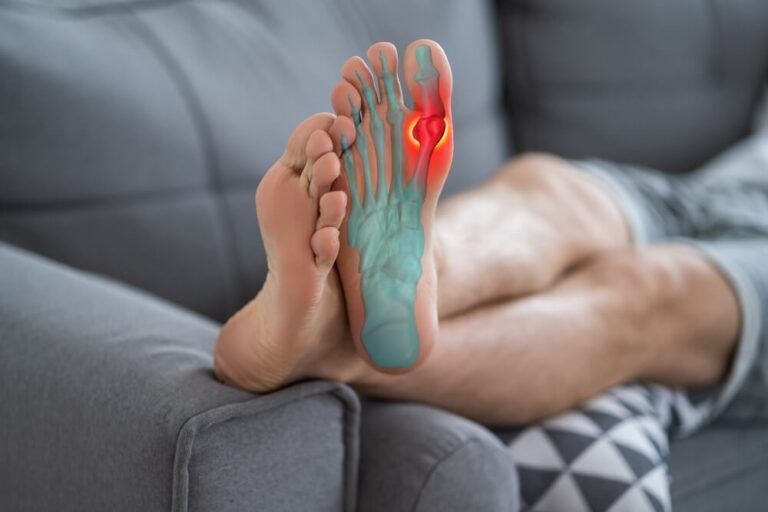How to Recognize the Early Signs of a Gout Flare-Up

A gout flare-up can occur suddenly and cause severe discomfort, so recognizing the early signs is essential for timely management. Here are some key indicators to watch out for:
1. Sudden Joint Pain
- Key symptom: Sharp, intense pain often described as throbbing or burning.
- Commonly affected areas: The big toe (most common), ankles, knees, wrists, and elbows.
- Onset: Pain may begin at night or early in the morning.
2. Redness and Warmth
- The affected joint often becomes red or purplish and feels warm to the touch.
- These symptoms mimic an infection but are specific to inflammation caused by uric acid crystals.
3. Swelling
- Noticeable swelling around the joint that appears suddenly.
- The skin over the joint may feel tight and look shiny due to the inflammation
4. Limited Range of Motion
- As inflammation increases, moving the affected joint becomes difficult and painful.
- Activities that were once simple, like walking or bending, may feel challenging.
5. Tingling or Discomfort Before the Flare-Up
- Some people report mild tingling, aching, or stiffness in the joint before a full flare-up occurs.
- This can be a warning sign to take preventive measures
6. Hypersensitivity in the Affected Area
- Even light pressure, like a bedsheet touching the affected joint, can cause severe pain.
- This sensitivity is often a hallmark of gout flare-ups.
What Triggers a Gout Flare-Up?
Being aware of potential triggers can help you act promptly:
- High-purine foods (e.g., red meat, shellfish, organ meats).
- Alcohol consumption, especially beer and spirits.
- Dehydration.
- Sudden weight loss or fasting.
- Certain medications (e.g., diuretics or aspirin).
What to Do if You Suspect a Flare-Up?
- Rest the Affected Joint: Avoid putting weight on it to minimize discomfort.
- Apply Ice Packs: Helps reduce swelling and numb the pain.
- Stay Hydrated: Drink plenty of water to help flush out excess uric acid.
- Take Medications: Use prescribed anti-inflammatory drugs like NSAIDs, colchicine, or corticosteroids if available.
- Contact Your Doctor: Early intervention can prevent the flare-up from worsening.
Recognizing these early signs and acting quickly can minimize the duration and severity of gout attacks. Regular monitoring and preventive measures can also help reduce the frequency of flare-ups.